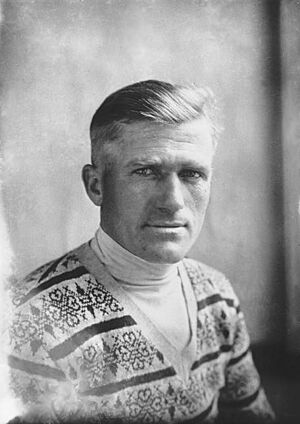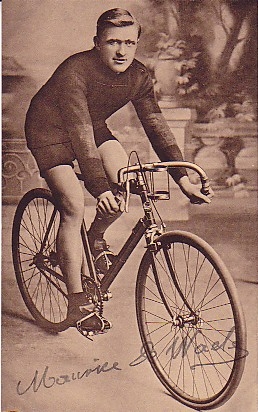Maurice De Waele facts for kids

De Waele at the 1929 Tour de France
|
|||
| Personal information | |||
|---|---|---|---|
| Full name | Maurice De Waele | ||
| Born | 27 December 1896 Lovendegem, East Flanders, Belgium |
||
| Died | 14 February 1952 (aged 55) Maldegem, East Flanders, Belgium |
||
| Team information | |||
| Discipline | Road | ||
| Role | Rider | ||
| Major wins | |||
|
|||
Maurice De Waele (born 27 December 1896 – died 14 February 1952) was a professional road bicycle racer from Belgium. This means he was a cyclist who competed in long-distance races on roads, often over many days. He is best known for winning the famous Tour de France race in 1929.
De Waele was a very strong cyclist. In the 1927 Tour de France, he finished second overall. He was nearly two hours behind the winner, Nicolas Frantz. The next year, in the 1928 Tour de France, he placed third. Frantz won that race again.
His biggest victory came in the 1929 Tour de France. Maurice De Waele was leading the race early on. But in stage seven, he had two flat tires. This caused him to lose his lead, and three other riders caught up to him. These riders were Frantz, Andre Leducq, and Victor Fontan.
Later, Victor Fontan became the sole leader. However, his bike broke, and he had to leave the race. This put De Waele back in the lead, just 75 seconds ahead of Frantz. But then De Waele also had more flat tires, and he lost his lead again. Luckily, Frantz also had a flat tire, which helped De Waele.
Near the end of the race, De Waele became very sick in Grenoble. It looked like he might have to quit. But his teammates helped him a lot. They supported him and made sure he could keep going. With their help, he managed to win the entire Tour de France!
After De Waele's victory, the Tour de France organizer, Henri Desgrange, was very upset. He felt that De Waele's win was not fair. Desgrange believed that De Waele's team, Alcyon, had helped him too much. At that time, riders were supposed to race as individuals. They were not allowed to work together, even if they were on the same team. Desgrange thought Alcyon riders had used "trickery" to help De Waele win, especially since he was sick.
Desgrange was so unhappy that he changed the rules for the Tour de France. For the next twenty years, he stopped allowing teams sponsored by companies. Instead, only national teams (like Team Belgium or Team France) were allowed to compete. He famously complained that his Tour had been "won by a corpse," meaning De Waele was so sick he shouldn't have won without help.
Maurice De Waele continued to race after his big win. He finished 5th in the 1931 Tour de France. He also won the Tour of the Basque Country twice, in 1928 and 1929.
Key Achievements
Maurice De Waele had a successful cycling career, winning many races. Here are some of his most important achievements:
Early Career (Independent Rider)
- In 1921, he won the overall title in the Tour of Belgium for independent riders.
- In 1922, he became the National Cyclo-cross Champion in Belgium. Cyclo-cross is a type of bicycle race that involves riding on different terrains, like dirt, grass, and mud, and sometimes carrying the bike over obstacles.
- He also won the Brussels–Luxembourg–Mondorf race in 1922.
Professional Career
- In 1923, he won the Arlon–Oostende race.
- In 1924, he won the Grand Prix Alceida.
- He won the Paris–Menen race twice, in 1926 and 1927.
- In 1928, he won the overall title in the Tour of the Basque Country. He won this race again in 1929.
- In 1929, he achieved his most famous victory: winning the 1929 Tour de France.
- In 1931, he won the overall title in the Tour of Belgium.
See also
 In Spanish: Maurice De Waele para niños
In Spanish: Maurice De Waele para niños
 | DeHart Hubbard |
 | Wilma Rudolph |
 | Jesse Owens |
 | Jackie Joyner-Kersee |
 | Major Taylor |


